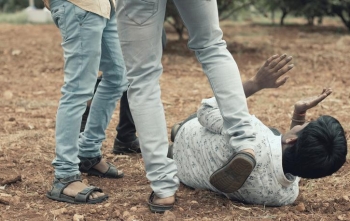
.png) Dr Suresh Mathew
Dr Suresh Mathew

It was an unusual letter, a strange one to say the least. A couple of years back, a 22-year-old man reportedly wrote to the President of India seeking his permission to join the Naxalites. He wrote: ‘The law-and-order system has failed me. ….I want to look elsewhere to preserve my dignity.’ He had cited examples of discrimination faced by the Dalit community to buttress his point. Such incidents regularly happen and Constitutional rights of people are thrown to the winds.
In this background, it is good to recall the Vaikom Satyagraha, the centenary celebrations of which is going on during this year. It was a movement that forced the authorities to give Dalits equal access to public spaces, specifically around the famous Vaikom temple, a hundred years back. However, the demand for Dalits’ entry into the temple found its fruition only 12 years later, in 1936, by a decree of then Travancore king.
The entrenched caste system continues to be the bane of Dalits even today, though its intensity might have softened. The rigid caste prejudice injects poison in the minds of the people to humiliate, harass and hound those at the bottom of the ladder of the society. Untouchability might be a thing of the past going by the existing laws, but the issue cannot be brushed aside as it raises its ugly head off and on. Some of the bizarre incidents in the recent past make us hang our head in shame.
A Dalit man’s thumb was chopped off because he dared to pick up a cricket ball while watching a match in Gujarat; in yet another bizarre incident from the same state, from where the Prime Minister and the Union Home Minister come, a Dalit man and his family members were thrashed because he chose to wear modern dresses and sun glasses.
Another outlandish incident was reported from Uttar Pradesh, governed by saffron icon Yogi Adityanath. A Dalit groom was beaten with rods and sticks and forced to dismount the horse by upper caste people. The latter could not stomach the fact that a Dalit man was going to marry on horseback.
In U.P. it is not uncommon that the Dalits face the music after they vote according to their conscience disregarding the dictates of the upper caste candidates and their goons. In Madhya Pradesh, a wedding procession of a Dalit BSF jawan was assaulted reportedly by upper caste men. These are tips of the iceberg. One can count a litany of attacks on Dalit men and women for living a life permitted by the Constitution.
Here comes the relevance of Vaikom Satyagraha. It was more than a demand for entry into one temple. It was a cry for social justice and human dignity. It was a revolutionary movement for equality in society and erasing the stain of untouchability.
Even as we mark its centenary, it is nothing but a shame that there are temples out of bounds for Dalits; there are things they are forbidden to do; they are tortured for trying to be equal to anyone else in the society. A change in the mindset of the so called upper castes alone would bring about the much-needed revolution. It would remain an uphill task so long as people in authority like a judge in Gujarat High Court, who asked the lawyer of a rape survivor to read Manusmirti to understand how women used to get married early in life, survive in the society.